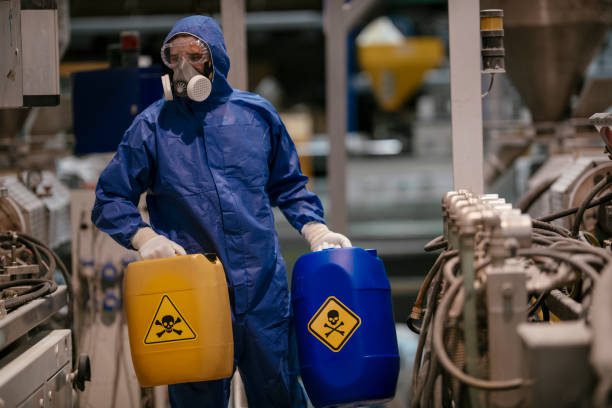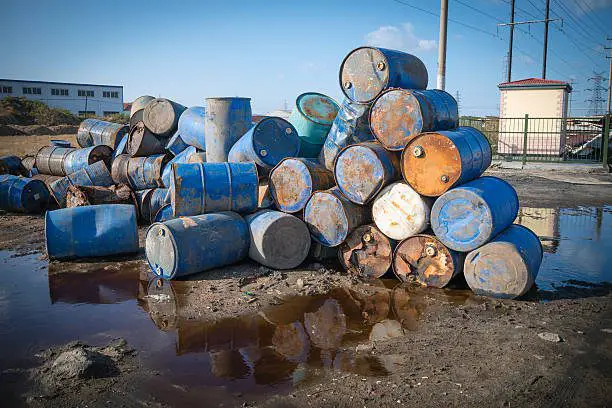For the sake of preserving both the environment and human health, chemical wastes management must be done properly. The following are some of the recommendations for properly handling chemical wastes:
Ways To Manage Chemical Wastes Properly

1. Determine the waste
To decide how to treat and dispose of the garbage appropriately, identify the chemical and physical qualities of the waste, including any dangerous characteristics.
Chemical wastes may be recognized in different ways:
Please consult the product label or the material safety data sheet (MSDS), these papers have to detail the chemical’s dangers as well as any handling and disposal safety measures that may be required.
Look for identifying signs or labels: It is mandatory to label many chemical wastes with symbols or phrases that indicate their hazardous nature.
For instance, a skull and crossbones serves as the global danger emblem for poisonous compounds.
- Use a chemical identifier: You may identify chemicals using a variety of instruments that are based on their physical characteristics, such as color, odor, and boiling point.
- Consult a specialist: If you are unable to identify a chemical waste using the procedures above, you may need to contact a qualified expert, such as a chemist or a specialist in hazardous materials.
Because they could need particular handling and disposal techniques to guarantee the safety of people and the environment, chemical wastes must be appropriately identified.
Read Also: Bulky Wastes Complete Management Guide
(2) Reduce waste production
By choosing less dangerous chemicals, using lesser amounts of chemicals, and looking for methods to reuse chemicals, you may limit the quantity of chemical waste that is produced.
To reduce the production of chemical waste, a number of methods may be used:
- Source reduction: This entails figuring out how to stop using dangerous substances altogether or to utilize them in less of a quantity. Reusing chemicals or treating them to recover valuable materials is known as recycling.
- Treatment: This entails modifying the waste chemically or physically to make it less dangerous or simpler to dispose of.
- Disposal: This entails properly getting rid of chemical waste in a place that can handle it, such a hazardous waste dump.
Chemicals should be stored properly to help avoid mishaps that might result in the discharge of dangerous compounds into the environment.
- Spill prevention: By using spill prevention strategies, you may lessen the quantity of chemical waste that is produced by unintentional spills.
- Substitution: Making safer replacements for dangerous chemicals may help cut down on the total production of chemical waste.
(3) Safely dispose of garbage
Chemical waste should be kept in a safe location and kept in the proper containers, such as labeled, closed drums. Chemical wastes must be stored properly to avoid mishaps, spills, and leaks that might endanger humans, animals, and the environment. Here are some broad recommendations for securely storing chemical wastes:
i. Correctly identify and label the chemical waste. Use labels for chemicals or danger warnings to make it obvious what is in each container.
ii. Chemicals should be kept in the proper containers. Use well-maintained storage containers that are suited for the individual chemical being kept. Make sure the containers are labeled and sealed appropriately.
iii. Keep chemicals in a safe place. Keep chemical waste in a special location that is off-limits to unauthorized people, away from other items.
iv. Observe appropriate handling and storage techniques. For handling and storing chemicals, according to the manufacturer’s instructions as well as any extra rules established by regional, national, or other legislation.
v. Regularly check and maintain storage spaces. Look for leaks, spills, or other indications of damage, and then take the necessary steps to clean up and fix any problems.
vi. Carefully dispose of chemical waste. When it comes time to get rid of chemical waste, engage a qualified garbage removal firm and follow the right processes.
(4) Use appropriate trash labeling
To describe the waste’s risks and contents, use the appropriate labels and placards. Chemical wastes must be appropriately labeled in order to protect individuals handling the chemicals and to dispose of them safely.
The following are general recommendations for marking chemical wastes:
- Use a label that is long-lasting, readable, and resistant to water, fading, peeling, and damage.
- Add the following details to the label:
i. The chemical’s brand and strength(s).
ii. Any potential risks associated with the chemical(s) (e.g. flammability, reactivity, toxicity).
iii. The garbage generator’s name and contact information (e.g. the laboratory or company).
iv. Use standardized language and symbols to communicate information about hazards. To identify the sort of danger, for instance, the flame and skull and crossbones symbols from the international hazard standard should be utilized.
v. A prominent spot on the container should have the label.
vi. You may make sure that chemical wastes are handled safely and responsibly by adhering to these recommendations and correctly labeling them.
Read Also: Business Wastes Complete Management Guide
(5) Manage garbage properly
When handling chemical waste, put on the right personal protection equipment and adhere to the correct handling and transport protocols.
Protecting the environment, human health, and safety depend on handling chemical waste responsibly. To treat chemical waste properly, the following actions may be taken:
- To ensure that chemical waste is appropriately kept, transported, and disposed of, it is crucial to correctly identify the kind of chemical waste.
- Chemical waste should be carefully kept in a safe location that is away from heat sources and is not likely to flood. Additionally, it has to be kept in the right, properly labeled, and sealed containers.
- Safely transport chemical waste: Chemical waste should be moved in a way that is both environmentally and humanly safe. This entails utilizing the proper containers and abiding by all applicable rules and legislation.
- Chemical waste has to be disposed of appropriately so that it is safe for both the environment and humans to consume. This can include processing the trash, neutralizing it, or getting rid of it at a place that has the appropriate permits.
- When managing chemical waste, it is crucial to adhere to all applicable rules and regulations. You should also obtain professional advice if you are unsure how to properly treat a certain kind of trash.
(6) Properly dispose of garbage
Chemical waste must either be neutralized or detoxified before being disposed of properly, or it must be dumped in a hazardous waste landfill.
Chemical waste must be disposed of properly to safeguard both the environment and public health. You may follow a few measures to properly dispose of chemical wastes:
- Recognize the waste: It’s critical to understand what chemicals are present in the garbage and at what levels. You may choose the appropriate disposal technique with the use of this information.
- Choose the appropriate disposal method: Some chemical wastes may be sent to a hazardous waste facility, while others may be disposed of in a conventional trash container.
For the proper disposal of chemical waste, it is crucial to adhere to all applicable federal, state, and municipal laws.
- Label the garbage: Be careful to clearly identify the contents of the waste container, as well as any potential risks.
This will make it more likely that everyone who comes into touch with the garbage will manage it correctly.
- Safely store the waste: Chemical waste has to be kept out of heat, sparks, and flames in a safe, well-ventilated environment. It ought to be kept in a manner that avoids spills and leaks.
- Take the garbage to a hazardous waste facility or dispose of it in accordance with local, state, and federal requirements by following the directions provided.
- You can contribute to making sure that chemical wastes are disposed of correctly and do not endanger the environment or human health by following these instructions.
(7) Maintain records
Maintain thorough records of the creation, handling, and disposal of chemical waste to guarantee compliance with laws and assist in monitoring the success of waste reduction initiatives. For a variety of reasons, it’s critical to maintain precise records of chemical waste.
First, organizations and institutions are often required by federal and state legislation to monitor and record the production, transportation, and disposal of chemical waste.
This makes it possible to safeguard both public health and safety as well as ecologically appropriate waste management.
Second, maintaining accurate records may assist a business or institution in identifying the sources of trash so that waste reduction and recycling initiatives can be put in place.
This may increase operational effectiveness, save money, and have a less negative impact on the environment. You must record the following details in order to retain records of chemical waste:
i. The kind and volume of each chemical waste produced.
ii. The time when the garbage was produced.
iii. The place where the garbage was produced.
iv. The way the garbage is handled and stored.
v. Name and contact details of the business or organization in charge of garbage disposal.
vi. Date of shipment of garbage for disposal.
vii. The firm or organization’s name and contact details that received the material for disposal.
As mandated by federal laws, it is crucial to retain these documents for at least three years. Additionally, you must maintain records of any staff training sessions on chemical waste management as well as any instances of chemical spills or leaks.
Read Also: All Cat Breeds: Complete List of Popular Cat Breeds

